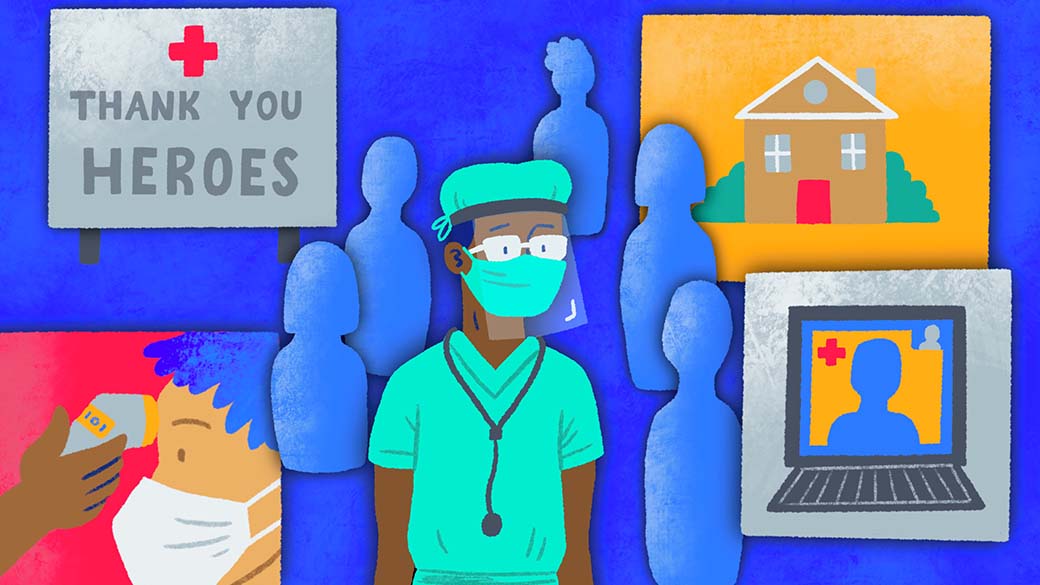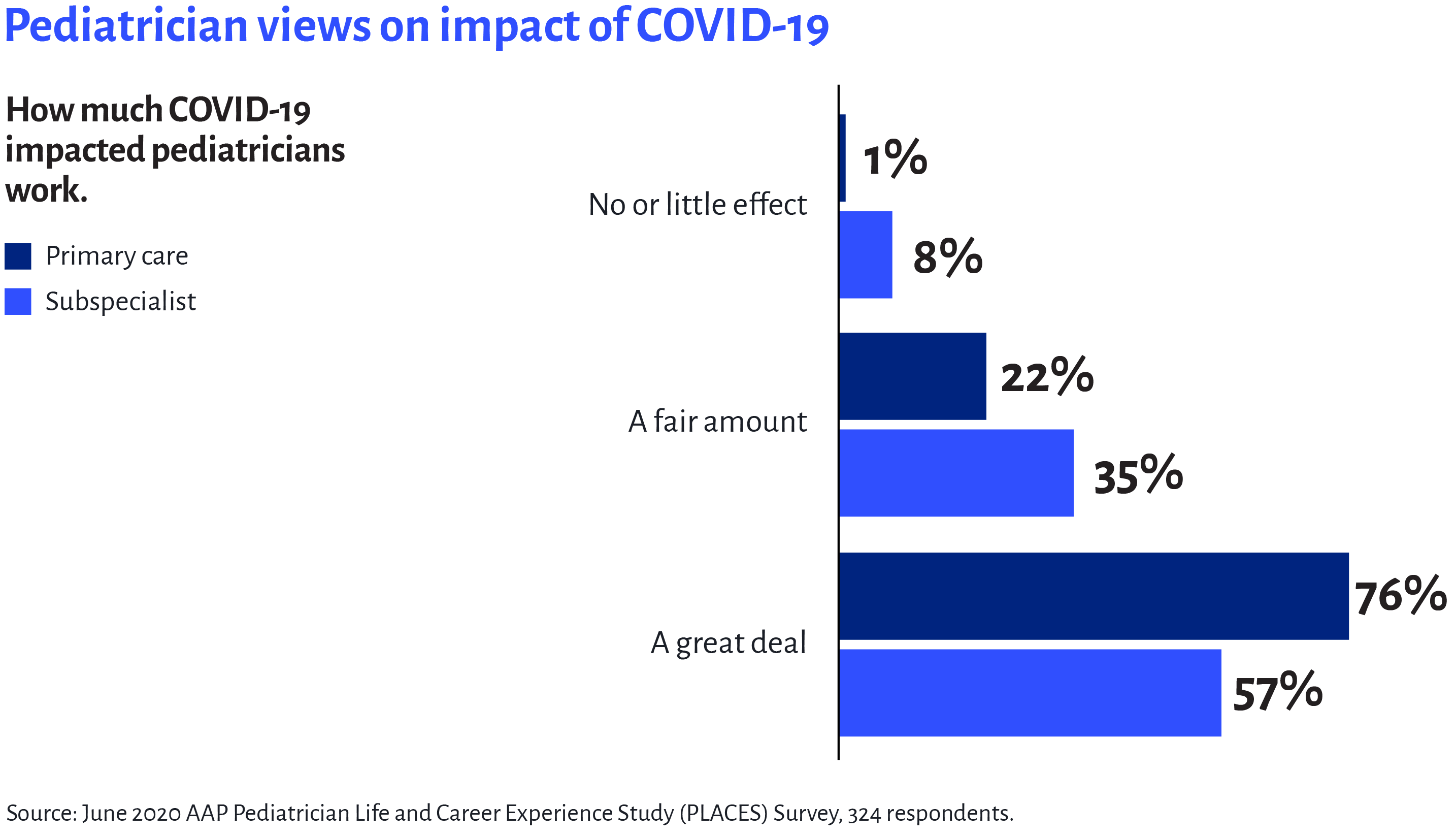Supporting Our Members
Information sharing and advocacy were top priorities for the AAP during the pandemic.
Information sharing and advocacy were top priorities for the AAP during the pandemic.

The pandemic raised a set of novel and disparate concerns for pediatricians. Throughout, the AAP sought to be a trusted partner, advising physicians on issues such as personal protective equipment (PPE) protocols and how to provide traditional services via telehealth appointments. AAP also advocated on behalf of pediatricians to policymakers.
“It evolved from how do you take care of people with COVID, to how do you run your office, to what to do about getting back to school, wearing masks, all of it,” said 2020 AAP President Sally Goza, MD, FAAP. “I mean, it was a whole gamut of information that we gave out. And we did review it every four weeks, at a minimum, and we updated it many, many times. There was a lot that went into that. And I think people were hungry for that.”
As hospital critical care units filled in spring of 2020, patients stopped visiting primary care doctors and specialists.
Eight in 10 primary care pediatricians surveyed in April 2020 reported that their work was greatly impacted. Two-thirds reported that they decreased their office hours, and most greatly increased telehealth practices. Nearly all reported that their preventive care and sick visits had decreased since the start of the pandemic. Seven in 10 experienced decreases of 50% or more in preventive care visits, and eight in 10 experienced similar decreases in sick visits.
"Patient visits fell dramatically, and money flow stopped. My income was greatly impacted and continues to be now because my own children are not in school full time and I cannot work full time as a result," said a primary care pediatrician in a small practice and mother of two children.
From the beginning, the AAP sought to ensure that its members received federal financial support to keep their doors open and continue to care for their patients. Initially, this meant advocating to ensure that Medicaid and Children's Health Insurance Program providers were included in the government provider relief funding, which originally was distributed only to Medicare providers. The AAP also urged the federal government to streamline the application process.
As a result, the Department of Health and Human Services refocused their relief funds to better target small practices and those that care for a higher number of patients enrolled in Medicaid and CHIP. Pediatricians received more than $700 million in relief funds, representing a major advocacy victory for the Academy.


Nurturing and reinforcing the connection of pediatricians and families is a relationship where the AAP can use its voice to push for better health outcomes as well as support for pediatric practices during a very challenging period of the pandemic. The AAP launched the "Call Your Pediatrician" campaign in May 2020 with these ideas in mind.
Using empathy and humor to connect with parents whose lives have been upended during the pandemic, the AAP developed a toolkit including social media graphics and videos to encourage parents to include a call with the pediatrician on their to-do list for the day.
“Parents have a lot on their minds right now. We want them to know pediatricians are open for business, and we are ready to schedule visits to make sure their children are fully immunized,” Dr. Goza said at the launch of the campaign.
In June 2020, AAP announced that its national conference and exhibition would be a virtual meeting.
“Our team did a fabulous job switching from an in-person meeting to a totally virtual meeting,” Dr. Goza said. “And I think it was very well received. People wanted to see each other, even if it was virtually. And I think that that shone through in that we had actually a really high attendance rate. It was probably one of the highest we've had. I think that was a time where pediatricians needed to get together. We needed to have that time, even if it was virtual, to say, we're all still here; we've made it.”
In July 2020 AAP’s Section on Global Health Education launched a webinar series titled Global Health Practice in the Time of COVID: Finding Effectiveness in Your Personal & Professional World. Topics included parenting in a pandemic, supporting health care workers and addressing health care disparities. The series drew viewers from more than 40 countries.

The virtual format “helped with connecting to a broader audience that wouldn’t have known or been able to participate physically,” said Chiquita Palha De Sousa, MD, MPH, FAAP, and chair of the AAP Section on Global Health Education. “It’s also a point of solidarity that we’re all in this together and dealing with similar issues,” she said.
AAP’s “Connecting With the Experts: A COVID-19 Townhall Series” debuted Sept. 9, 2020, as a six-event series. It now has more 40 episodes and counting and has attracted more than 5,000 viewers.

The pandemic added new and significant stressors to medical practice, including physical, mental and logistical challenges. Some physicians experienced high levels of fear, guilt, concern for occupational hazards, and economic uncertainty, even as they recognized their right to protect their own health, protect their families and preserve their ability to care for future patients.
“The pandemic has obviously put a tremendous strain and stress on our entire health system and everyone in it,” said Lee Savio Beers, MD, FAAP, and 2021 president of AAP. “Not just direct health care providers, but everyone who works within health systems and public health systems.”

The pandemic also highlighted the multiple roles women disproportionately fill in many households, where they often assume primary responsibility for child care and, during the pandemic, homeschooling children.
"Having to be a full-time physician, full-time mom and full-time teacher during our surge was unbelievable," said a PLACES survey participant who is a primary care pediatrician in group practice and mother of two. "I felt pulled in all directions and didn't do anything well."
For many, the strain of work combined with the increased demands brought by home life changes and limitations on socializing made a challenging situation even harder.
“Personally, I've found working during the pandemic to be very emotionally challenging,” one physician wrote in a survey response. “In the past, I've been able to balance work with meaningful personal interactions, and these experiences—going out for dinner, traveling out of town, seeing movies and shows, etc.—have brought a nice balance to my life. However, I am really no longer able to do these things, which has been very emotionally challenging, particularly as time has gone on.”
The health and wellness of pediatric health care providers is one of the AAP’s strategic priorities, as physician wellness is integral to the health of the profession and quality of care for children. The AAP supports a cultural shift in how we value providers’ well-being as not only a metric of the care we are able to provide children and their families but more importantly as a mechanism for pediatricians to thrive in medicine.
Despite the challenges of the pandemic, pediatricians continued to report that they felt the importance of their roles. According to the April 2022 PLACES survey, most all (94%) strongly agreed or agreed their work contributes to the health of families in their community, and 72% strongly agreed or agreed that their community recognizes pediatricians as a trusted source regarding COVID-19 and children. Three-fourths (77%) strongly agreed or agreed that they were satisfied with their career as a physician.
“The way that the American Academy of Pediatrics approaches any topic is to ask two central questions. What do children need and what do pediatricians need in order to take care of them? And those were the two questions that drove us through every aspect of this pandemic.”
- Mark Del Monte, CEO of the American Academy of Pediatrics
Find the AAP's policy, guidance, vaccine information and more.
09/20/2023
American Academy of Pediatrics